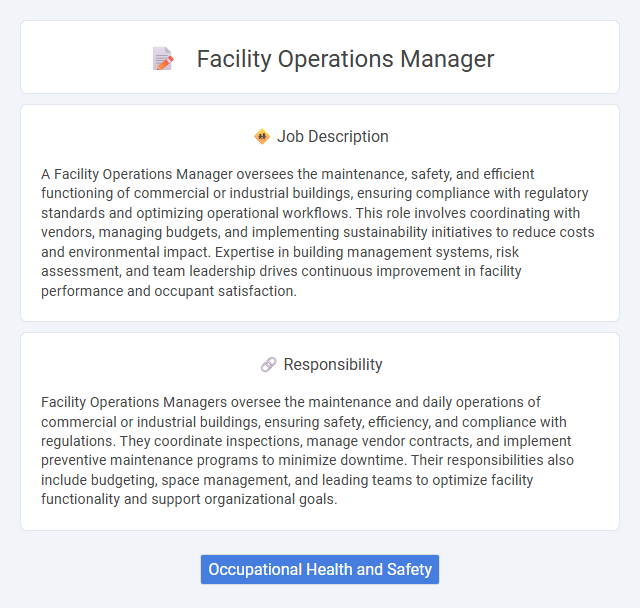
A Facility Operations Manager oversees the maintenance, safety, and efficient functioning of commercial or industrial buildings, ensuring compliance with regulatory standards and optimizing operational workflows. This role involves coordinating with vendors, managing budgets, and implementing sustainability initiatives to reduce costs and environmental impact. Expertise in building management systems, risk assessment, and team leadership drives continuous improvement in facility performance and occupant satisfaction.
Individuals with strong organizational and leadership skills are likely to excel as Facility Operations Managers, given the demands for coordinating multiple tasks and managing diverse teams. Those comfortable with problem-solving under pressure and maintaining operational efficiency may find the role particularly suitable. Conversely, people who struggle with multitasking or adapting to rapidly changing environments might face challenges in this position.
Qualification
Facility Operations Manager positions require a bachelor's degree in facilities management, engineering, or business administration, paired with 5-7 years of experience in managing building operations and maintenance teams. Proficiency in HVAC systems, safety protocols, and regulatory compliance ensures efficient facility management and risk mitigation. Strong leadership skills, project management certification (such as PMP), and expertise in budget planning are essential to optimize operational workflow and reduce costs.
Responsibility
Facility Operations Managers oversee the maintenance and daily operations of commercial or industrial buildings, ensuring safety, efficiency, and compliance with regulations. They coordinate inspections, manage vendor contracts, and implement preventive maintenance programs to minimize downtime. Their responsibilities also include budgeting, space management, and leading teams to optimize facility functionality and support organizational goals.
Benefit
A Facility Operations Manager likely improves overall efficiency by streamlining maintenance and operational processes, which could lead to significant cost savings for the organization. This role may enhance safety compliance, reducing the probability of accidents and associated liabilities. Employees in this position often experience career growth opportunities due to their critical impact on facility performance and organizational success.
Challenge
Managing a Facility Operations Manager role likely involves overseeing complex maintenance schedules and ensuring compliance with safety regulations, which can present significant logistical challenges. The probability of encountering unexpected equipment failures or facility emergencies may require quick decision-making and resource allocation. Balancing budget constraints with operational efficiency is often a critical and ongoing challenge in this position.
Career Advancement
Facility Operations Managers oversee maintenance, safety, and efficiency of building operations, ensuring seamless functionality across all departments. Mastery in project management, regulatory compliance, and vendor relations accelerates career progression to senior management roles, including Director of Facilities or VP of Operations. Continuous skill development in sustainability practices and automation technologies enhances leadership potential and industry competitiveness.
Key Terms
Occupational Health and Safety
Facility Operations Managers play a crucial role in enforcing Occupational Health and Safety (OHS) standards to ensure a safe working environment. They implement safety protocols, conduct regular risk assessments, and oversee employee training on OHS compliance to mitigate workplace hazards. Effective management of emergency procedures and adherence to regulatory requirements directly contribute to reducing accidents and maintaining operational continuity.
 kuljobs.com
kuljobs.com